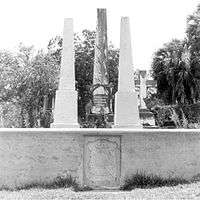Catherine Willis Gray
Catherine Daingerfield Willis Gray Murat (August 17, 1803 – August 6, 1867) was an American socialite and preservationist who was the great-grandniece of George Washington.
Catherine Willis Gray | |
|---|---|
 Close-up of portrait at the DAR Museum in Washington, DC. | |
| Born | Catherine Daingerfield Willis August 17, 1803 Fredericksburg City, Virginia, U.S. |
| Died | August 6, 1867 (aged 63) |
| Spouse(s) | |
| Parent(s) | Byrd C. Willis Mary Lewis Willis |
Early life
Catherine was born in Fredericksburg City, Virginia on August 17, 1803. She was a daughter of Colonel Byrd Charles Willis (1781–1846) and his wife Mary (née Lewis) Willis (1782–1834), the granddaughter of Fielding Lewis, George Washington's brother-in-law. Through the Lewis family, she was also a relative of explorer Meriwether Lewis.[1]
Her parents made their first home in Orange near the Court House. Later they came to Willis Hill. Col. Willis paid little attention to the management of the plantation and instead spent his time fox hunting, racing, and attending parties. Income was derived from the race profits and the sale of fire wood.
Preservation
Murat became involved in the nation's first successful preservation effort, the work to preserve George Washington's home. In 1858, Murat was appointed the first Vice Regent for Florida for the Mount Vernon Ladies' Association, the title given the central person in each state organizing the association's work. Working closely with Ellen Call Long, she led the efforts as the state raised $3,791 toward the restoration of Mount Vernon, the largest per capita amount raised by any of the 30 contributing states.[2] Murat served in that post until her death. Despite her staunch Unionism, she was named master of ceremonies during the celebrations of the Florida Secession Convention in 1861. Later, during the American Civil War, Murat participated in the local "Soldiers Aid Societies," who met as sewing circles to clothe the southern troops.[3]
Personal life
Murat married Atchison Gray (b. 1800), son of John Gray of Traveller's Rest (Kearneysville, West Virginia). Atchison died less than twelve months after their marriage and their child, born after his death, died also.
Second marriage
About 1825, Murat came to Tallahassee with her parents, three brothers and two sisters. In 1826, she met and married her second husband, Prince Charles Louis Napoleon Achille Murat. He was a son of Joachim Murat, former King of Naples and the former Caroline Bonaparte. His maternal uncles included Joseph Bonaparte, Napoleon I of France, Lucien Bonaparte, Louis Bonaparte and Jérôme Bonaparte. His maternal aunts included Elisa Bonaparte and Pauline Bonaparte.[4]
Murat, was entertained when abroad. On 8 September 1831,[5] Catherine was present at the coronation of William IV of the United Kingdom and was given a seat in Westminster Abbey.[6][7]
In 1847, she inherited the 2,000-acre (8.1 km2) Lipona Plantation in Jefferson County, Florida upon the death of her husband. In 1854 she bought Bellevue, in Leon County, which became her primary residence.

Early in 1866, Napoleon III of France, a maternal first cousin of her husband, granted Murat an annuity from the French government in consideration of her losses during the Civil War. Catherine Murat died August 6, 1867 at Bellevue in Tallahassee.
Legacy
Murat's marker in the old Tallahassee Episcopal Cemetery reads:
"SACRED to the Memory of PRINCESS C. A. MURAT, Widow of COL. CHARLES LOUIS NAPOLEON ACHILLES MURAT, and Daughter of the late COL. BIRD C. WILLIS, of Virginia. Who departed this life on 6 August 1867, in the 64th year of her age. A kind and affectionate wife and sister, a sincere and devoted friend. None knew her but to love her. None named her but to praise. This Monument is erected to her memory, by her bereaved Brother and Sister."
References
- Glenn, Justin (2014). The Washingtons: A Family History: Volume 1: Seven Generations of the Presidential Branch. Savas Publishing. p. 1789. ISBN 978-1-940669-26-7. Retrieved 13 March 2020.
- Revolution, Daughters of the American (1919). Daughters of the American Revolution Magazine. National Society of the Daughters of the American Revolution. p. 604. Retrieved 13 March 2020.
- Hussey, John (2008). Cruisers, Cotton and Confederates: Liverpool Waterfront in the Days of the Confederacy. Countyvise Ltd. p. 119. ISBN 978-1-906823-03-0. Retrieved 13 March 2020.
- Davis, Betty; Trackers, Big Bend Ghost (2011). Haunted Monticello, Florida. Arcadia Publishing. p. 8. ISBN 978-1-62584-155-1. Retrieved 13 March 2020.
- "Medal commemorating the Coronation of William IV 1831". Royal Collection Trust.
- "John Bull Locomotive". History Wired. Smithsonian Institution. Retrieved 2008-08-04.
- "PRR Chronology: 1831" (PDF). Pennsylvania Railroad Technical and Historical Society. June 2004. Retrieved 2008-08-04.